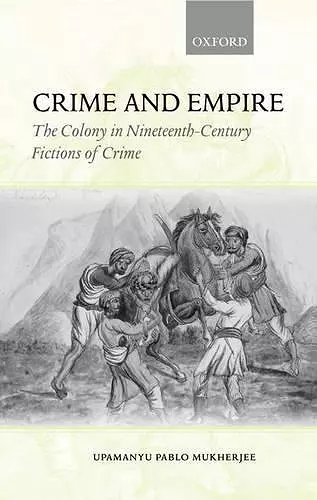Crime and Empire
The Colony in Nineteenth-Century Fictions of Crime
Upamanyu Pablo Mukherjee author
Format:Hardback
Publisher:Oxford University Press
Published:9th Oct '03
Currently unavailable, and unfortunately no date known when it will be back

The language of crime and punishment is everywhere, especially in the context of building new global orders where old imperial relationships between the west and the rest of the world are being redefined and redesigned. This book is about one of the formative moments of this rhetorical strategy of representing empires. By looking at a variety of British narratives about India being produced from the later half of the eighteenth century onwards, it suggests that the discourse of crime was one of the major representative tools which the British employed to understand, imagine, and rule the vast country. However, to understand the full implication of this strategy for British understanding of both the colonised 'others' and a particular image of 'self', we must study the formation of this discourse not only in the context of the colony, but of its peculiar importance within 'domestic' Britain itself. Nineteenth-Century British society placed a huge amount of importance on issues of crime, punishment, order, and policing. These issues became fundamental to British claims of being a civilised nation. Naturally, they became an important part of British colonial/imperial strategy. But, since in Britain these issues were sites of contest and not consent, of debate and opposition and not unquestioned hegemonic power, they were inherently risky tools to use in building an ideology of empire. As the various readings of the narratives employing 'fictions' of crime offered here shows, an opposition or critique of empire was formed through these fictions even as they were used to build a consensus for empire-building. The slippages and ambiguities associated with imperial narratives then, are not products of some inherent semiotic disorder. Rather, they grew out of a particular history within which the rhetoric employed by these narratives took shape. This book is an attempt to recover the traces of that history within the various imperial fictions of crime.
As Upamanyu Pablo Mukherjee argues in his insightful, well-researched Crime and Empire, the British campaigns against both sati and Thuggee were part of a more general reformist approach to India that at once mirrored the rise of the "new police" in Britain and had the effect of criminalizing Indian culture as a whole. And if secular, utilitarian reformism worked to criminalize India, that was just as true of evangelicalism, as Jeffrey Cox points out: "For evangelicals ... something was very wrong with India, and the source of the evil was crystal clear: it was religion. Hinduism was obscene and cruel and bloody and lascivious, and so forth, and because of Hinduism, Indians were liars, thieves, widow-burners, murderers of infants, and so forth"(24)...
...From the time of the Black Hole of Calcutta in 1757, Mukherjee contends, to that of the Indian Rebellion or Mutiny of 185758 and beyond, imperial discourse about India was mainly a "rhetoric of crime" and policing (15). And among the writers of crime fiction whom he analyzes, none is more significant than policeman Taylor. * Victorian Literature and Culture, 2006 *
Mukherjee's crimes and criminals reveal a remarkable agreement that in the novel as elsewhere, Justice is a far cry from Law. * Times Literary Supplement *
ISBN: 9780199261055
Dimensions: 223mm x 145mm x 18mm
Weight: 420g
218 pages